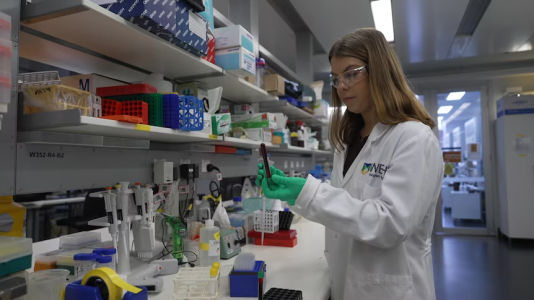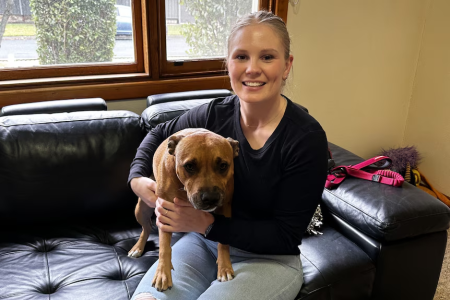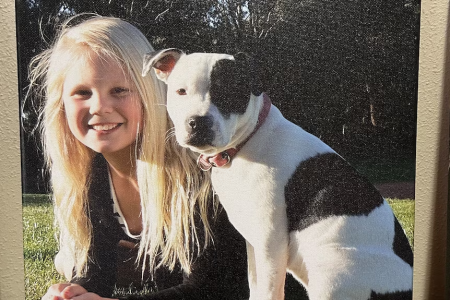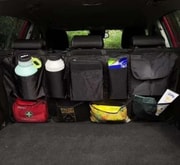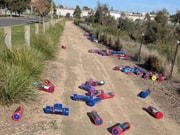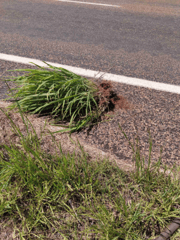New coeliac disease blood test set to enable diagnosis on gluten-free diets
By
ABC News
- Replies 0
Eating gluten was making Eliza Long sick, but it was the only way for her to get a life-altering diagnosis.
Aged 11, she underwent a gastroscopy at the Royal Children's Hospital in Melbourne, with a biopsy revealing she had coeliac disease.
More than 350,000 Australians live with the disease, caused by an immune reaction to the gluten protein found in wheat, rye and barley.
Current testing requires patients to eat gluten for weeks beforehand, in what is called the gluten challenge.
"Knowing that what I was eating was going to make me feel really unwell was quite concerning," Ms Long, now aged 23, said.
And the lengthy process was "confronting for a kid", she said.
Researchers say the gluten challenge puts people off getting answers, with up to 80 per cent of coeliac cases remaining undiagnosed globally.
Now, there is hope a "world-first" blood test being developed in Australia can bring that barrier down.
He said a new test being developed by WEHI researchers with Brisbane-based Novoviah Pharmaceuticals could "revolutionise" the diagnostic process for patients.
"It's just a simple blood test, they don't need an invasive gastroscopy and, importantly, they don't even need to be eating gluten for it to be accurate," he said.
The test involves mixing a person's blood sample with gluten in a test tube, which then signals whether the T cells that cause coeliac disease are present.
Dr Tye-Din said it could improve detection of the disease, particularly among those on gluten-free diets who did not want to eat gluten and make themselves unwell.
"About one in 70 Australians are affected, but four out of five people don't know they have it," he said.
"It's really important to make a diagnosis of coeliac disease because it can lead to long-term health issues such as gut symptoms, osteoporosis, infertility, even some forms of cancer, such as lymphoma."
A study of 181 blood samples from people with and without coeliac disease found a "very high accuracy" for the new test to make a diagnosis or exclude it, even in those on gluten-free diets.
In one case, Dr Tye-Din said a patient who had been diagnosed 10 years earlier tested negative, allowing a different diagnosis to be made.
"This test allowed us to find the right treatment for her," he said.
Researchers are working to confirm the test's accuracy across diverse populations and plan to make it available within the next two years.
Ms Long said not having to eat gluten for her diagnosis would have been "life-changing".
"To be able to go to your doctor and get the blood test … it will encourage a lot of people to go and get it done," she said.
By Anna McGuinness, Sarah Lawrence and Shannon Schubert
Aged 11, she underwent a gastroscopy at the Royal Children's Hospital in Melbourne, with a biopsy revealing she had coeliac disease.
More than 350,000 Australians live with the disease, caused by an immune reaction to the gluten protein found in wheat, rye and barley.
Current testing requires patients to eat gluten for weeks beforehand, in what is called the gluten challenge.
"Knowing that what I was eating was going to make me feel really unwell was quite concerning," Ms Long, now aged 23, said.
And the lengthy process was "confronting for a kid", she said.
Researchers say the gluten challenge puts people off getting answers, with up to 80 per cent of coeliac cases remaining undiagnosed globally.
Now, there is hope a "world-first" blood test being developed in Australia can bring that barrier down.
'Revolutionary' test
Jason Tye-Din is the head of the coeliac research laboratory at the Walter and Eliza Hall Institute of Medical Research (WEHI) and a gastroenterologist at Royal Melbourne Hospital.He said a new test being developed by WEHI researchers with Brisbane-based Novoviah Pharmaceuticals could "revolutionise" the diagnostic process for patients.
"It's just a simple blood test, they don't need an invasive gastroscopy and, importantly, they don't even need to be eating gluten for it to be accurate," he said.
The test involves mixing a person's blood sample with gluten in a test tube, which then signals whether the T cells that cause coeliac disease are present.
Dr Tye-Din said it could improve detection of the disease, particularly among those on gluten-free diets who did not want to eat gluten and make themselves unwell.
"About one in 70 Australians are affected, but four out of five people don't know they have it," he said.
"It's really important to make a diagnosis of coeliac disease because it can lead to long-term health issues such as gut symptoms, osteoporosis, infertility, even some forms of cancer, such as lymphoma."
A study of 181 blood samples from people with and without coeliac disease found a "very high accuracy" for the new test to make a diagnosis or exclude it, even in those on gluten-free diets.
In one case, Dr Tye-Din said a patient who had been diagnosed 10 years earlier tested negative, allowing a different diagnosis to be made.
"This test allowed us to find the right treatment for her," he said.
Ms Long said not having to eat gluten for her diagnosis would have been "life-changing".
"To be able to go to your doctor and get the blood test … it will encourage a lot of people to go and get it done," she said.
By Anna McGuinness, Sarah Lawrence and Shannon Schubert

